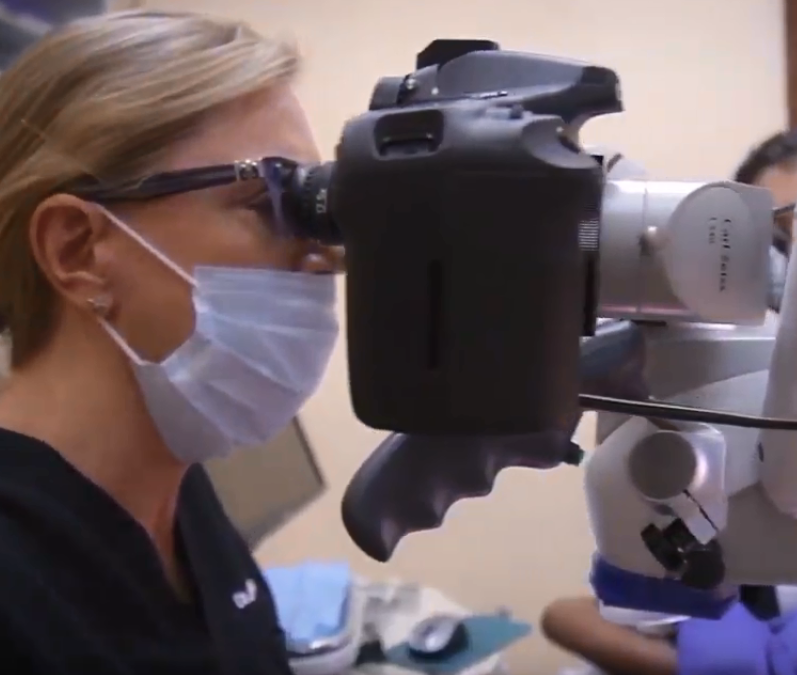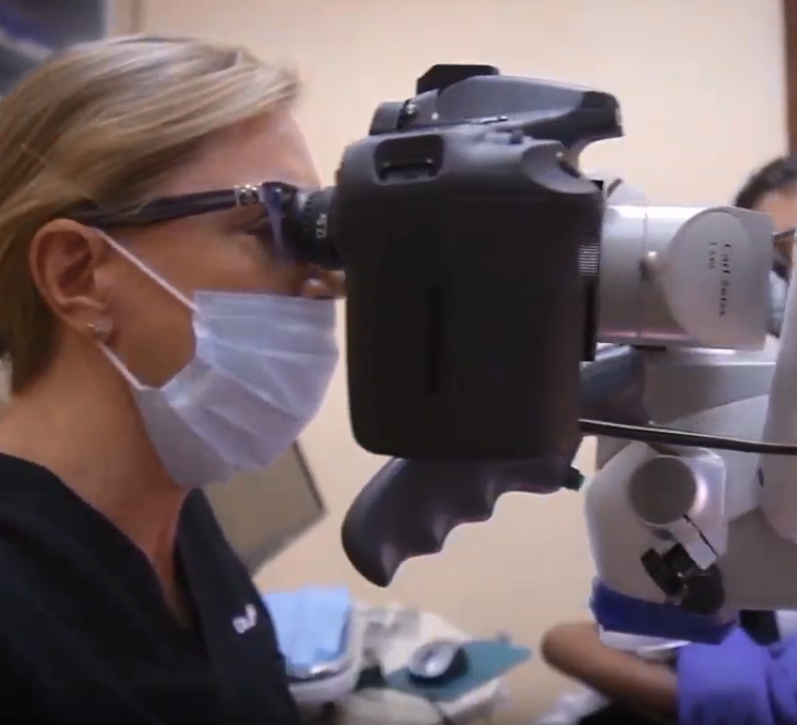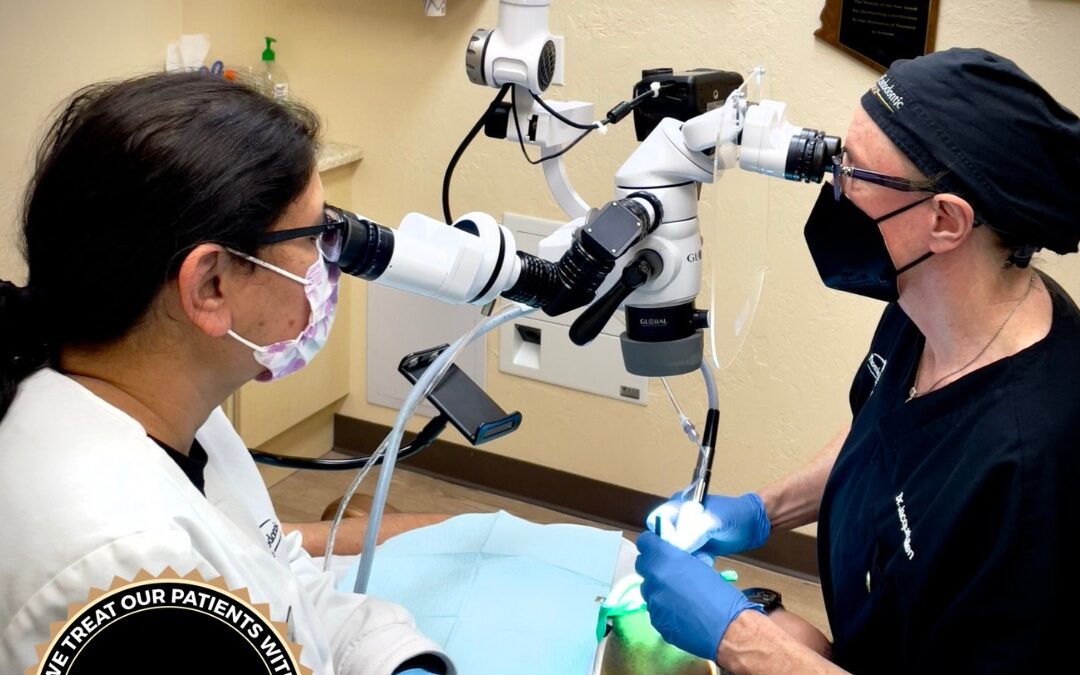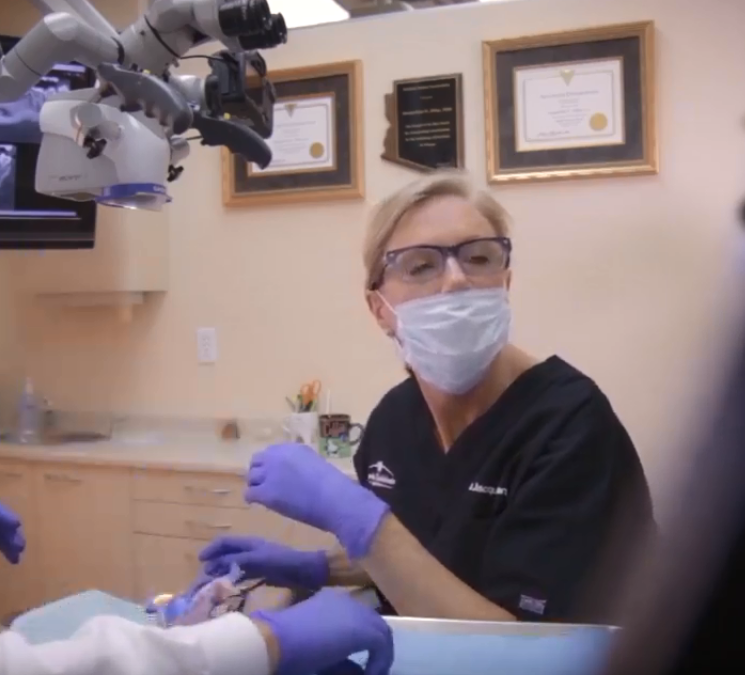by Dr. Jacqueline S. Allen | Jul 15, 2019 | Blog, Endodontics, Phoenix Endodontic Group, Root Canal
If you are referred to an endodontist for a root canal, you may be surprised to learn that, as critical as the procedure is to saving your natural tooth, you will also need a second procedure to ensure its long-term success. Most of the time, your endodontist will recommend placing a crown on the tooth with the root canal. To understand why, it is helpful to review what root canal treatments do and the after-care needed to support them.
Why Teeth Treated With Root Canals Need Crowns
- A root canal replaces your tooth’s nerve pulp with a biocompatible material. This substitution of gutta-percha or another biocompatible substance is what makes it possible to save your tooth, but it also makes the tooth more brittle. This means it can be more vulnerable to chipping or cracking.
- The infection or breakage that led to the need for a root canal may have permanently weakened the tooth. By the time a root canal is recommended, your tooth may have already sustained structural damage. A crown can cover your entire tooth above the root line and provide protection your natural tooth has lost.
- Previous dental work may have weakened your tooth. Dental fillings can fail and leave teeth prone to decay. Teeth on either side of a bridge may have been altered to hold the restoration in place. Other types of dental work can also reduce the strength of your teeth.
- Crowns can prevent coronal leakage. If the filling that seals in the biocompatible tooth root material develops a leak, infection can get in and ruin the root canal. Crowns are the best restoration to prevent this type of potential damage.
“Root canals regularly save natural teeth, and a root canal topped with a crown can allow that tooth to last as long as the rest of your teeth,” says Dr. Allen, an endodontist with the Phoenix Endodontic Group. “Our practice is happy to explain the importance of each step of the root canal process.”

by Dr. Jacqueline S. Allen | Jun 25, 2019 | Blog, Dental Implants, Dentistry
As more people consider dental implants when natural teeth cannot be saved, some patients may wonder what level of discomfort to expect. This is a complex question, as some people need tooth extractions, sinus lifts, or bone grafts in conjunction with a dental implant. However, there are some general guidelines to how much pain is “normal” when you have a dental implant, and what kind of pain warrants a call to your dentist or endodontist.

When You Might Experience Pain During The Dental Implant Process
- During the implant procedure itself: This is possible, but not common, because your dentist will use the best type of anesthesia for your circumstances. This can include heavy local anesthesia and/or some type of sedation.
- After getting a dental implant: Once the anesthesia wears off, it is normal to experience swelling for the first three to four days after your operation and some pain may remain for as long as 7-10 days.
- If you had teeth extracted, a bone graft, or a sinus lift with your dental implant: All of these procedures can result in additional discomfort.
- If you experience complications during the healing process: If your post-op swelling goes away and then returns accompanied by pain, this may indicate you have an infection. Call your implant surgeon or endodontist – they may ask you return to be examined or may write you a prescription for an antibiotic.
Things You Can Do To Reduce Post-Operative Pain
- Take pain relievers as prescribed. Your dental implant provider will likely send you home with a prescription for ibuprofen or another pain reliever.
- Reduce swelling and pain with cold packs. Apply a cold pack or even a bag of frozen peas to the area of your cheek over the implant site. Avoid skin irritation by wrapping the cold pack in a thin cotton washcloth.
- Bathe the gums covering your implant with warm salt water. Do not swish! Hold the water in your mouth near the implant site, then spit it out gently. Repeat several times in a row, every few hours, for the first one to three days after your surgery.
“Dental implants can be a safe, durable, permanent solution for improving your oral health,” says Dr. Jacqueline S. Allen, an endodontist practicing at the Phoenix Endodontic Group. “Our staff can provide you with a comprehensive overview of how we can work together to minimize your pain during and after the implant surgery.”

by Dr. Jacqueline S. Allen | May 28, 2019 | Blog, Endodontics, Endodontist, Phoenix Endodontic Group, Root Canal
Determining whether you need a root canal or another type of dental treatment is usually handled by your general dentist or endodontist. You can avoid many complications by knowing the signs and symptoms indicating a root canal may be needed, and making an appointment to have your tooth examined.
Signs You May Need A Root Canal

Root canals are often the treatment of choice when a tooth has become injured or infected at a level impacting your dental pulp – the part of your tooth beneath the enamel and dentin layers, made up of blood vessels, nerves, and connective tissue.
There are many ways this part of the tooth can be injured:
- A chip or crack in the tooth lets bacteria into the pulp, causing infection
- Severe, untreated tooth decay or cavities
- Trauma to the face resulting in damage to your tooth’s structure
Sometimes teeth needing root canals show few symptoms and require diagnosis through careful examination by a dental professional using radiographs or other imaging techniques. It’s often apparent, though, when something is wrong with your tooth. Some of the symptoms that may call for a root canal include:
- A severe toothache that gets worse when you chew or apply pressure near the tooth
- Swelling and tenderness of the gums near the tooth
- Discoloration (usually darkening) of the tooth
- The tooth is sensitive to hot or cold temperatures, and discomfort remains after the source of the temperature change is gone
- A pimple on the gums that persists or keeps reappearing
If you experience any of these symptoms, call your general dentist or endodontist immediately.
“Recognizing the signs of damaged or infected teeth can save patients extra discomfort and ensure their root canal treatment begins early,” says Dr. Allen, an endodontist who practices with the Phoenix Endodontic Group.

by Dr. Jacqueline S. Allen | Apr 24, 2019 | Blog, Endodontics, Featured, Root Canal, Save Your Tooth Month
If you have a natural tooth compromised by infection or injury, you may believe that extraction is your only solution. However, many compromised teeth can be saved by endodontic treatments such as root canals or other more complex procedures. Endodontic practice groups across the nation will be celebrating Save Your Tooth Month in May. The event is sponsored by the American Association of Endodontists and is aimed at making people aware of their endodontic treatment options.
 How Endodontic Treatment Can Save Your Teeth
How Endodontic Treatment Can Save Your Teeth
Endodontic treatment can save natural teeth that might otherwise face extraction. Endodontists are well qualified to save your natural teeth because:
- They receive two extra years of specialty training after receiving their degree as a dentist.
- They learn how to perform root canals, apicoectomies, and other endodontic treatments.
- They focus their practice exclusively on endodontic treatment, performing as many as 25 root canals per week.
- They use techniques and special tools that are especially effective at saving natural teeth.
- They work closely with general dentists, so it is easy to get a consultation and referral if your tooth needs endodontic treatment to preserve it.
“Endodontists’ combination of advanced training, access to unique tools and techniques, and the frequency with which we deal with root canals and other forms of endodontic treatment provide our patients with comfort and peace of mind,” says Dr. Allen, who practices with the Phoenix Endodontic Group.

by Dr. Jacqueline S. Allen | Apr 18, 2019 | Blog, Business, Endodontics, General Information
 We are excited to tell you about a new development in our practice, one that is designed to better serve the restorative dentistry practices we work with. We have instituted a new position called Professional Relationship Director, whose role is to ensure seamless communication between our practices, and to share with you relevant information to enhance patient care.
We are excited to tell you about a new development in our practice, one that is designed to better serve the restorative dentistry practices we work with. We have instituted a new position called Professional Relationship Director, whose role is to ensure seamless communication between our practices, and to share with you relevant information to enhance patient care.
We are proud to introduce you to the person who is going to perform this role, Kim Rowell.
Kim may not really need an introduction, since she has worked with us for several years in other roles, but you are going to be seeing and hearing a lot more from her in the future.
Kim will be making regular visits to your office to check in with you and your team. She will call you with any necessary updates on cases involving patients you refer. And she will always be available to take your questions, field requests for information, or organize meetings with the doctors when needed. We can tell you from experience working with Kim, she’s passionate and knowledgeable about dentistry, she loves to work with people, and she knows how to get things done. Kim has our full confidence in performing this job-which is to be, exclusively, the liaison between our practice and yours.
You can reach her directly at 602-288-9149 or by email at kim@phoenixendodontist.com
Once again, We are excited to deliver this news, and look forward to taking our working relationship-and the quality of care we provide to patients-to an even higher level.

by Dr. Jacqueline S. Allen | Mar 25, 2019 | Blog, Dental Implants, Phoenix Endodontic Group
When teeth are injured, infected, or structurally damaged, it can be challenging to determine the best path back to oral health. Sometimes endodontists can save natural teeth with root canals. When teeth are beyond saving, dental implants are an option. Implants are safe, remain securely in your mouth 24/7, and help prevent further jawbone loss. Properly cared for dental implants can last many years.

What The Research Says About Dental Implant Longevity
- Dental implants have been used reliably for more than 50 years. Implants are recognized as more effective than many types of bridgework.
- Root canal treatments and dental implants have similar levels of durability. Both restorations have a success rate of about 95 percent over post-implant periods as long as 16 years.
- Pre-implant oral health and post-implant oral care impact dental implant longevity. The best candidates for implants have healthy gums and enough jawbone density for support. Heavy smokers or patients with systemic conditions like diabetes must be evaluated for implants on a case-by-case basis. Following dental implant surgery, caring for the implant like a natural tooth is critical to ensuring its long-term endurance.
- Teeth grinding threatens dental implant success. The forces involved in grinding (bruxism) can damage the implant. Patients with bruxism who use a night guard or take other steps to control their teeth grinding can expect a better success rate.
“The choice to get dental implants should rest on the health of the teeth in question, the health of the patient, and their commitment to post-procedure upkeep,” says Dr. Jacqueline S. Allen, who practices with the Phoenix Endodontic Group. “Like root canals, the procedure has a high success rate under the right conditions.”










